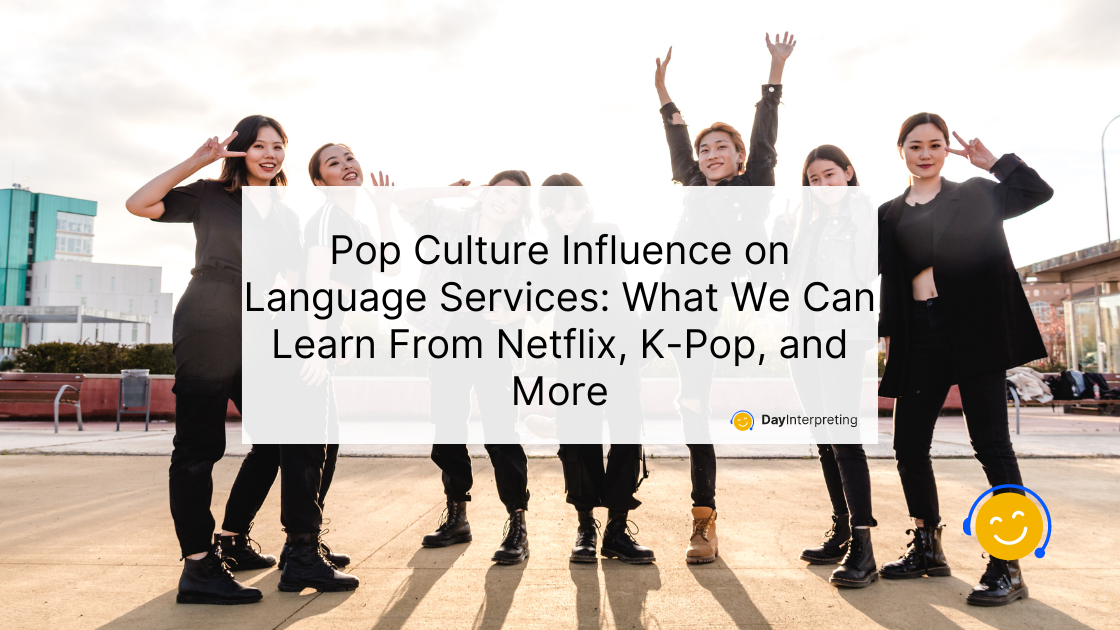Language is constantly evolving, and one of the biggest drivers of this evolution is pop culture. From the rise of streaming platforms like Netflix to the global phenomenon of K-Pop, pop culture has had a massive impact on how people learn and use language. But what exactly can we learn from these pop culture giants? In this article, we’ll explore how pop culture influences language services and what lessons we can take from it.
The Rise of Global Pop Culture
How Netflix Brings the World Together
Netflix isn’t just a place to binge-watch your favorite shows; it’s also a platform that brings together different cultures, languages, and perspectives. With content from all over the world, Netflix has introduced viewers to foreign films and TV shows that they might not have discovered otherwise. Thanks to subtitling and dubbing services, people can now watch content from countries like South Korea, Spain, and France without needing to speak the language.
For example, shows like Money Heist (from Spain) and Squid Game (from South Korea) have become worldwide sensations, even though they were created in languages that aren’t globally dominant like English. To make these shows accessible to everyone, Netflix provides language services that include high-quality translations, subtitles, and voice dubbing. This allows people who don’t speak the original language to fully enjoy the show.
K-Pop: A Language Phenomenon
K-Pop, the Korean pop music genre, is another pop culture phenomenon that has captured hearts across the globe. But it’s not just about catchy tunes and energetic dance moves—K-Pop has played a role in spreading the Korean language worldwide. Popular K-Pop groups like BTS and BLACKPINK have fans singing along to Korean lyrics, often without understanding the language fully at first.
Many fans are so dedicated that they take it a step further by learning Korean. This has led to a growing demand for Korean language lessons, apps, and translation services. The impact of K-Pop on language services is clear: when a culture becomes popular, people become more interested in learning the language, and language service providers need to step up to meet that demand.
The Importance of Accurate Translations in Pop Culture
Lost in Translation: Why Quality Matters
With the rise of global content comes the challenge of providing accurate translations. Poor translations can ruin the experience of a TV show, song, or movie. A joke that doesn’t make sense or a sentence that’s completely misunderstood can leave the audience confused and disappointed.
For example, imagine watching a show like Squid Game where the tension and drama are critical. If the subtitles or dubbed audio don’t match the original meaning, it could change the entire plot or tone. This is why Netflix and other streaming services invest heavily in professional translators and linguists to make sure the original meaning and feel of the show is preserved.
The Role of AI in Language Services
Interestingly, technology likeartificial intelligence (AI) is playing a growing role in providing translations and subtitles. AI-powered tools are helping to make language services faster and more accessible. However, they still have their limits. While AI can handle basic translations, human translators are often needed to capture the cultural context, emotions, and nuances that machines might miss.
So, what can we learn from this? As pop culture spreads globally, the need for language services will continue to grow. But the quality of those services must keep pace. Whether it’s a TV show or a K-Pop song, getting the translation right is key to maintaining the integrity of the content.
How Pop Culture Is Driving Language Learning
TV Shows as Learning Tools
One surprising trend we’re seeing is that TV shows and movies are becoming tools for learning new languages. Thanks to platforms like Netflix, people can watch foreign-language shows with subtitles and gradually pick up new words and phrases. Some language learners even use these shows as part of their study routine.
Imagine learning Spanish by watching Money Heist or improving your Korean by watching Crash Landing on You. The ability to listen to native speakers while reading translations is incredibly valuable for learners. It helps with pronunciation, understanding sentence structure, and even learning slang or informal phrases that might not be taught in a classroom.
Music as a Gateway to New Languages
K-Pop fans are learning Korean, but it doesn’t stop there. Spanish-language music, like the global hit Despacito, has also had an impact. When a song goes viral, people become curious about the language behind it. They start looking up translations, learning lyrics, and even picking up the language themselves.
Music is a fun and engaging way to learn new languages, and pop culture is full of it. Language services can leverage this by creating more tools that blend entertainment with education. Apps that teach language through music or movies, for example, are becoming more popular because they make learning fun.
What’s Next for Language Services?
The Future of Multilingual Content
As global pop culture continues to grow, the demand for multilingual content will only increase. Streaming services, music platforms, and social media all need to cater to a diverse audience, and this means offering more translation and language learning options.
Language services will also need to evolve. AI will continue to improve, but the human touch will remain important for capturing cultural nuances and emotions. Additionally, there will likely be more collaboration between content creators and language experts to ensure that pop culture is accessible to everyone, no matter what language they speak.
Final Thoughts
Pop culture and language services are closely linked. Whether it’s through Netflix, K-Pop, or viral music hits, people are more connected to different languages than ever before. This has created exciting opportunities for language learning and translation services to thrive. As we continue to embrace global pop culture, one thing is clear: language services will play an even more crucial role in helping us understand and enjoy the world around us.





0 Comments